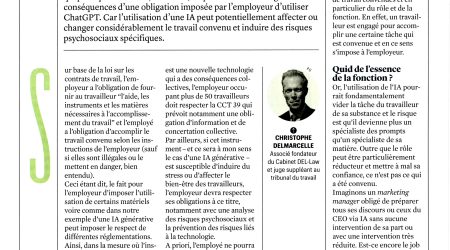When recruiters spy on social networks...
Posted the 30 October 2018I apply for a job and during the interview I'm told that the company carries out ‘pre-employment’ checks to verify the information on my CV, particularly on the Internet. Is this legal?
According to some professionals, up to three out of four resumes may be misleading. The principle of trust in candidates' statements is gradually disappearing. Companies, eager to avoid the costs of a bad hire and prevent damage to their reputation, are increasingly resorting to pre-employment checks or "pre-employment screening," either internally or through external providers. These checks aim to determine the reliability of the information provided by the candidate and ensure there are no critical issues.
Under the current Belgian legislation, there is nothing to prevent an employer from implementing this type of check. Specifically, in this context, they can verify available sources such as references, published works, diplomas, and of course, information found on the Internet. As such, consulting publicly available information on professional social media (such as LinkedIn or Viadeo) or private social media (such as Facebook or Instagram) can be very useful for recruiters.
However, companies must consider the collective bargaining agreement (CBA) No. 38, which mandates respect for the candidate's privacy during the selection process (all steps taken to hire personnel). This means that questions about personal life can only be asked if they relate to the nature and conditions of the position. This principle can also extend to data collected on the Internet. This is, in fact, the stance of the CNIL, the French data privacy authority. Therefore, checking financial information may be acceptable for a financial director position.
For professional social media, information found there can generally be considered professional in nature, which is not the case for information available on private social media. A recruiter can easily find details about a candidate's family situation, political views, or sexual orientation. However, considering these factors may influence the decision, which would no longer be based solely on the person's qualifications and skills. And CBA 38 stipulates that a candidate has the right to know why they were rejected.
We must also not forget the famous GDPR (General Data Protection Regulation), which imposes several obligations on the employer, including obtaining consent or justifying legitimate interest, and informing the candidate of the purpose, recipients, data retention period, and their rights (portability, refusal, access, and correction).
Finally, care should be taken to ensure that the checks are proportionate, limited in time, and do not lead to illegal discrimination.
It is also important to note that when a company uses third-party services, those parties may be subject to the law of July 16, 1991, on private detectives, which imposes various additional obligations (licensing, reporting, etc.).
Related articles

Is an employer allowed to mandate the use of artificial intelligence tools by employees ? (Trends, 17-07-2025)

Caution if a former colleague opposed to your employer asks you to testify in their favor
